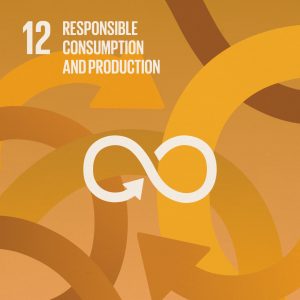by Jerald Crook
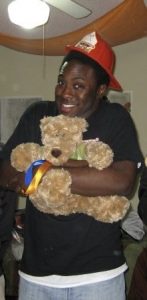
Jerald as an Auburn Freshman, holding his teddy bear (Jay).
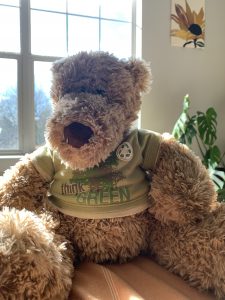
Jay today.
“Should I show them my sustainability-themed bear from when I worked at Build-a-Bear?”
The three dots from my fellow Auburn band alum Becca’s (‘11) end of the iMessage chat popped up immediately.
*bwoop* “Probably not.”
I was only slightly crushed that Jay’s (the bear) cameo appearance in my Zoom interview scheduled for the next day had been canceled. The reality is that I was absolutely jazzed that within a few weeks I could very well be embarking on a new career adventure. The week before, a recruiter for a startup called Ridwell messaged me on LinkedIn to let me know my experience and interests seemed like a great fit for their Atlanta Community Launcher position. I had no idea what a Ridwell was, but I’m always tempted by work within the context of “community,” so I took the bait. This is what I learned in the four ensuing interviews:
In 2018 Ryan Metzger and his son Owen realized that their Seattle home had accumulated a sizable pile of old batteries and decided to dispose of them sustainably. Learning that their local waste removal didn’t accommodate the disposal of old batteries, the father and son team took matters into their own hands, identifying the appropriate steps and facilities to properly dispose of the batteries. The Metzger’s neighbors learned of their operation and soon the neighborhood joined in. Seeing an opportunity to help divert other waste items away from the landfill, Ryan evolved his family project into what is now Ridwell, a company that helps people reduce their waste by gathering their hard-to-recycle materials.
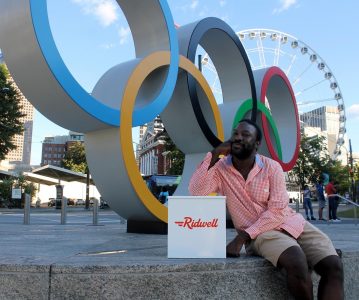
Jerald with Ridwell in Atlanta’s Centennial Park.
Ridwell is subscription-based. The company currently offers 12-month, 6-month, and 3-month plans starting at $12 or $14 (it varies by city), and increasing by $2 based on the plan’s duration (e.g. $12 for 12 months, $14 for 6 months). Each Ridwell subscriber is supplied with a 13×13 aluminum bin, four labeled cloth bags, and a bi-weekly pickup service of items that fall into four core categories—plastic film, batteries, lightbulbs, and threads (e.g. clothes, linens, towels, shoes, etc)—and a rotating featured category. The featured categories run the gamut, from old eye glasses, to leftover Halloween candy, to polypropylene campaign yard signs, to holiday lights, to pill bottles to e-waste (e.g. old laptops, cell phones, cords). Ridwell also provides its members with the opportunity to divert more complex items such as paint and styrofoam for an extra fee (no more than $1). Through the use of its member app, Ridwell subscribers communicate with the company which items they’re leaving in their bin as well as any other issues or questions they may have. From there, the “wasting less” is left to us!
As if helping people get rid of hard-to-recycle materials wasn’t already an amazing feat, Ridwell takes it a step further by making sure that the items we collect are properly recycled or downstreamed. For example, the plastic film that we gather is packed up and sent to our national partner, Trex, who then turns the material into polywood for outdoor decking or furniture. Items such as eye glasses or leftover Halloween candy are donated to local social or service organizations such as the Lions Club or the Ronald McDonald House. My favorite partnership story is one in which a Seattle-based artist receives the aforementioned bread tags to use in her own sustainable artwork.
So after learning about all of this, how could I possibly pass up the opportunity to join the good work that Ridwell was doing? I studied History at Auburn, and obtained a minor in sustainability in the early aughts of the program. Most of my work since then has been cultural work, working in the public service sector, working for nonprofits and state and local governments for the last ten years, even starting my own arts and humanities nonprofit, Higher Ground Society, along the way. I have now shifted to work in the corporate world, something I never really imagined doing until I came into close contact with a company that embodied the same values and was as passionate about the planet as I was.
Ridwell is still in its infancy with respect to the hefty waste-reducing task set before it. With 192 employees, the company also operates in Portland, the Bay Area, Austin, Denver, and most recently, the Twin Cities (Minneapolis and St. Paul). I am tasked with launching the company’s market in Atlanta, along with my cohort colleagues who are doing the same in Los Angeles. So far my work has consisted of organizing the Atlanta metro’s ZIP codes into logical sections and meeting with members of the community who are passionate about being good stewards of our planet, both things that I personally find particularly enjoyable and fulfilling. I’m equally excited that, if I do my job right, Atlanta will be the first Ridwell city east of the Mississippi!
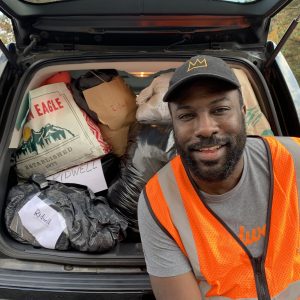
Jerald with his haul for the winter warmth drive.
At the beginning of the month I completed a demonstration of Ridwell’s services for parts of Decatur and central and east Atlanta. During this demonstration I gathered “winter warmth” items such as coats, scarves, hats, and gloves. At the end of my day I was able to donate more than 300 pounds of winter warmth to Atlanta Mission, Atlanta’s largest and longest-running provider of services to homeless men, women, and children. Last week, I facilitated a similar demonstration, this time picking up leftover Halloween candy. This haul was donated to the Joseph B. Whitehead Boys & Girls Club in south Atlanta. Both of the organizations were thrilled to receive the items as it enabled them to better serve their clients. That’s the beauty of Ridwell–we take the issue of a community’s waste, and spin it to positively impact the very same community.
I consider myself incredibly fortunate. Everyone can’t say that they have a job that they genuinely enjoy. Even further, everyone can’t say that they have a job where they see the positive impact that they’re making in real time. I can attest to both of these sentiments. One of my favorite aspects of this job is discussing Ridwell’s mission with potential members and seeing the aha! moments when they begin to connect the various items they use in their everyday life with Ridwell’s core and featured categories. It’s so refreshing to empower someone to do right by our planet, and by extension, our communities and future generations. The day that I responded to that LinkedIn message was the day my career leveled up in a new and meaningful way.
If you live in Atlanta and would like to get plugged into Ridwell, click here to join our waitlist which helps to ensure the company will come to town. You can also reach out to me at jerald.crook@ridwell.com or set up a time for us to chat here.
If you’re in a Ridwell city already, or would like to bring Ridwell to your city, visit here, verify your ZIP code, and let us know that you’re ready to waste less. We would love to have you as part of our community. War Eagle and stay Green!
Jerald Crook graduated from Auburn in Spring 2012 with a major in History and minor in Sustainability Studies. Jerald is a Ridwell Atlanta Community Launcher.
Learn about the SDGs & AU and our contributions related to this post.

